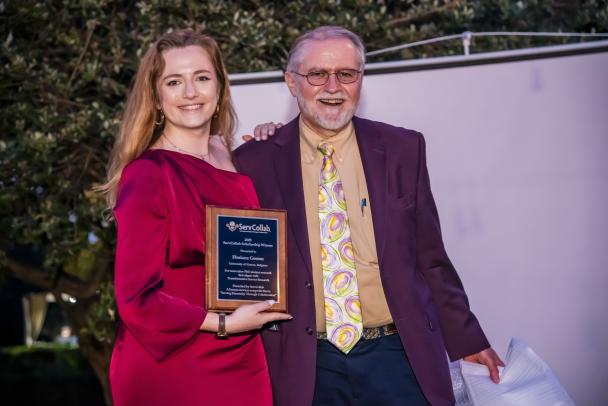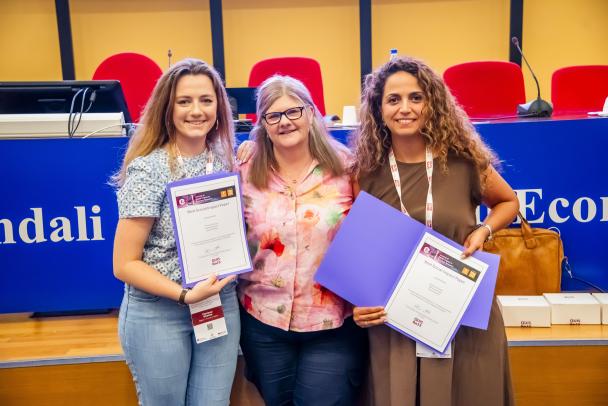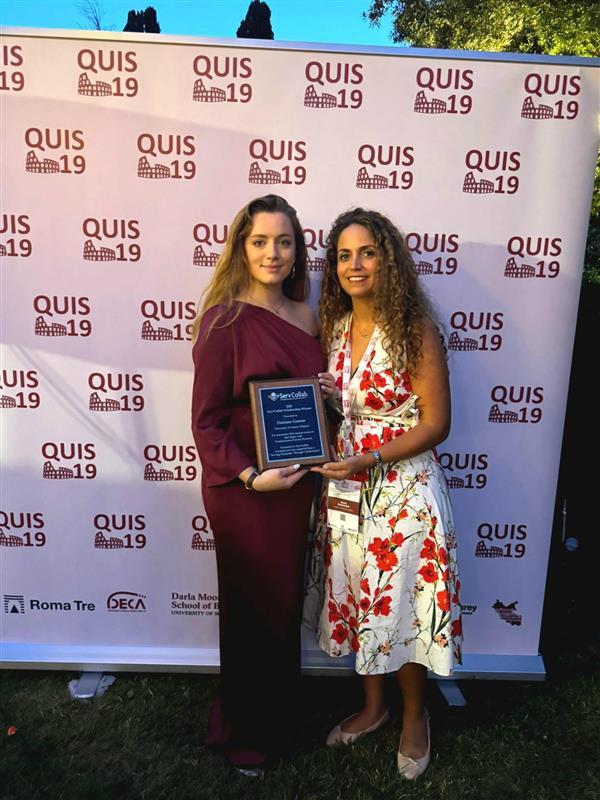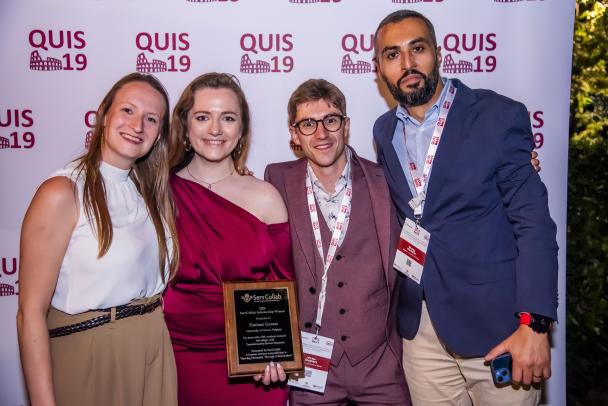Bienvenue au Nadi-CeRCLe, Centre de Recherche en Marketing et Gestion des Services de l'Université de Namur. Créé en 2005 au sein de la Faculté des sciences économiques, sociales et de gestion, le Nadi- CeRCLe rassemble une équipe dynamique d'enseignants, de chercheurs, de doctorants et de praticiens. Depuis 2018, le CeRCLe est fier d'être un partenaire fondateur de l'Institut Numérique de Namur (INN), faisant avancer la recherche de pointe et la collaboration à l'ère numérique.
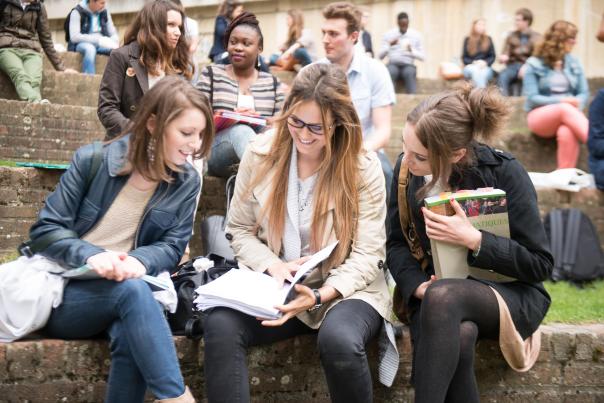

Spotlight
News
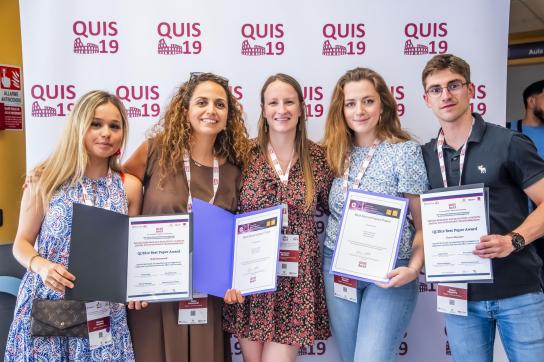
EMCP Faculty: three researchers receive awards - #1 Floriane Goosse receives double award for her research with societal impact
EMCP Faculty: three researchers receive awards - #1 Floriane Goosse receives double award for her research with societal impact
The NaDI-CeRCLe research center has distinguished itself brilliantly on the international scene in recent weeks. Three young researchers from the EMCP Faculty have received prestigious recognition at leading international events for their research in service management: they are Floriane Goosse, Victor Sluÿters and Florence Nizette. This summer, let's discover the work of these PhD students and their significant contributions to the advancement of knowledge and practice in this field.
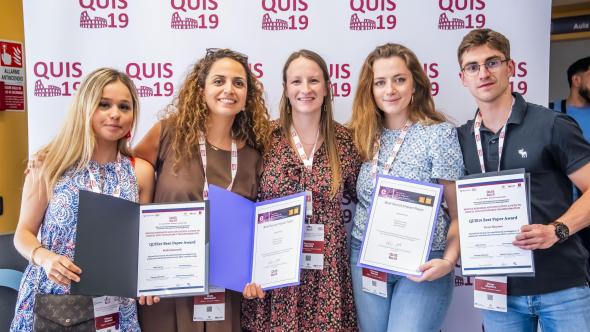
After winning the prestigious "Best Research Paper Award" at the SERVSIG conference by the American Marketing Association in 2024 for her thesis paper, Floriane Goosse, a researcher at the NaDI-CeRCLe research center, is among the two winners of the ServCollab Scholarship 2025, an international doctoral scholarship awarded by an American organization dedicated to promoting scientific research with high societal impact.
No fewer than 37 doctoral students from universities around the world were in the running to receive this scholarship. Two researchers were chosen after an in-depth selection process: Griffin Colaizzi, a PhD student in psychology at Northeastern University (USA), and Floriane Goosse, a PhD student at UNamur within NaDI-CeRCLE.
New technologies to empower people with disabilities
Supervised by Professors Wafa Hammedi (UNamur) and Dominik Mahr (Maastricht University), Floriane Goosse's thesis explores how new technologies, such as intelligent voice assistants, can empower people with disabilities, particularly the visually impaired, and thus significantly improve their well-being.
A high-potential project that convinced the members of the ServCollab jury, made up of eminent researchers in the field. The jury was particularly impressed by the young researcher's methodological rigor and praised her alignment with the principles of Transformative Service Research as well as her deep determination to create a tangible impact on the lives of so-called vulnerable people.
Triple recognition for Floriane Goosse
Floriane Goosse also took part in the 19th International Research Symposium on Service Excellence in Management (QUIS19), the bi-annual benchmark conference in service management, held in Rome in early June. On this occasion, his research once again distinguished itself by winning the prize for best research with societal impact, awarded by the conference's scientific committee. This prestigious international recognition crowns a rigorous and deeply committed body of work. Three major recognitions in less than a year, saluting both the scientific excellence and the strong societal impact of a particularly promising piece of research.
.
This recognition means a lot to me, and is a great encouragement for the continuation of my work, which I'm carrying out in collaboration with my co-sponsors, Professor Wafa Hammedi (NaDI-CeRCLE) and Professor Dominik Mahr (University of Maastricht). In my own small way, I'm delighted to be helping to change perspectives in the field of marketing, which is often focused on the corporate world, by putting research at the service of the community.
Find out more about NaDI-CeRCLe
The aim of the NaDI-CeRCLe Research Center is to actively promote theoretical and empirical research, both fundamental and applied, in the field of marketing and services, and more specifically in the areas of consumption and leisure.
.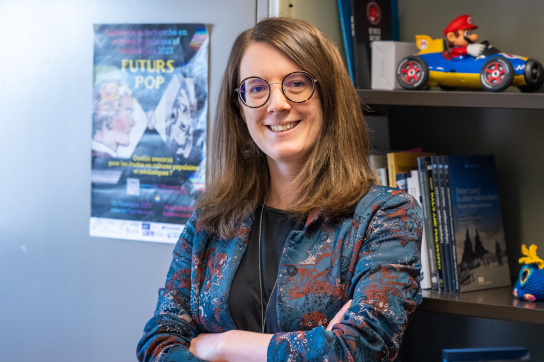
Is watching gaming gaming? Twitch and the video game revolution
Is watching gaming gaming? Twitch and the video game revolution
A lifelong video game enthusiast, Fanny Barnabé, a researcher at the CRIDS research center (Namur Digital Institute) and lecturer at the University of Namur, explores behind the scenes of a major cultural phenomenon: video game streaming on Twitch. Between humor, irony and toxic discourse, she deciphers the issues at stake in a digital space in the throes of change.
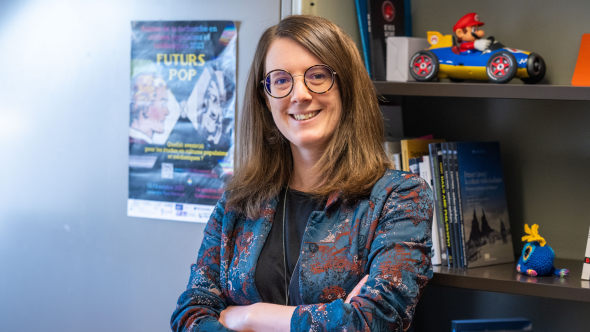
Video games are no longer just a pastime: they've become an object of study in their own right. And Fanny Barnabé is one of its leading figures at UNamur. Trained as a literary scholar, she turned to Game Studies to better understand the complex fictional universes that have always fascinated her. "It was because of video games that I studied literature," she confides with a smile. Today, she's interested in a fast-growing phenomenon: the broadcasting of live video game games on platforms like Twitch.

Twitch, between humor and toxic speeches
On Twitch, millions of viewers watch streamers play their favorite games every day. This practice, known as "secondary gaming" (a concept developed by ULiège researcher Julie Delbouille), involves playing vicariously by watching someone else hold the controller. "Some people no longer play themselves, they watch others play. It's become a fully-fledged way of consuming video games", explains Fanny Barnabé, "Twitch is a space where humor reigns, often in the form of irony or second degree. But it's also a place where toxicity can develop very quickly". Hence the theme of his current research: when does an ironic comment become violent? At what point can we determine whether or not a comment is acceptable in the video game context?
A fast-changing industry
Fanny Barnabé's work doesn't stop at Twitch. She has also studied in-game storytelling, tutorials, or even players' creative practices, such as fan fiction or "machinimas" (films made within games themselves).
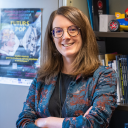
Video games are an incredibly rich and interdisciplinary field of study
And this terrain is changing fast. Very fast. "Video games have gone from a niche hobby to a mass phenomenon. Today, over 90% of young people play," she points out. This popularity is accompanied by an economic transformation: in the context of platform capitalism, the practice of gaming tends to become profitable, monetized, professionalized. "We've gone from the game you buy once, to the "game as a service" model, and to streaming, where professional streamers somehow convert their gaming experience into advertising revenue."
A mirror of our changing society
For Fanny Barnabé, it's hard to predict how the world of video games will evolve in the future. "It's becoming very difficult to talk about video games as a single object, so diverse are the practices," she explains. Between mobile games like Candy Crush, e-sport competitions or collaborative online adventures, the uses are multiple and reflect the complexity of our digital society.

This diversity is part of a broader context: that of platform capitalism. "Gaming, which was originally a leisure practice, is now integrated into profit-making logics," observes the researcher. Streaming, in particular, illustrates this transformation: gaming is becoming a productive, income-generating activity, sometimes even a profession in its own right.
Fanny Barnabé - portrait
At 36, Fanny Barnabé recently joined the ranks of UNamur academics. She is a lecturer in the "Social, Political and Communication Sciences" Department of the SciencesPo Economics Management Communication Faculty (EMCP). There, she teaches students in the three-year bachelor's program in interactive and participatory media and digital transition. Next academic year, she will be teaching the Media Narration and Storytelling course.
Fanny is also passionate about Japan. In 2017-2018, she completed a one-year postdoctoral stay in Kyoto, at the Ritsumeikan Center for Game Studies, under the direction of Professor Hiroshi Yoshida, with the help of a Marie-Curie COFUND fellowship from the Université de Liège (co-funded by the European Union). This stay was devoted to the study of video game paratexts.
During the academic mission organized by the Wallonie-Bruxelles International, on the sidelines of the Osaka World Expo, she was able to return to Tokyo and Kyoto to re-establish links with various colleagues specializing in game studies and set up research partnerships between Japanese institutions and UNamur.

Training
Discover our courses in economics, management, communication and political science.
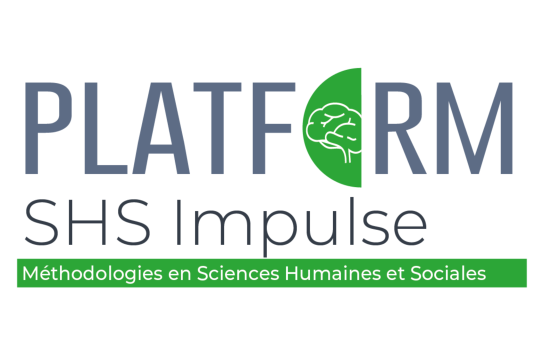
New impetus for the humanities and social sciences at UNamur
New impetus for the humanities and social sciences at UNamur
A new platform dedicated to research in the humanities and social sciences (SHS) is being launched at UNamur. The aim? To offer SHS researchers methodological support tailored to their needs and strengthen SHS excellence at UNamur. This platform, SHS Impulse, will provide various services such as financial support for training, consultancy, access to resources, or co-financed software purchases.
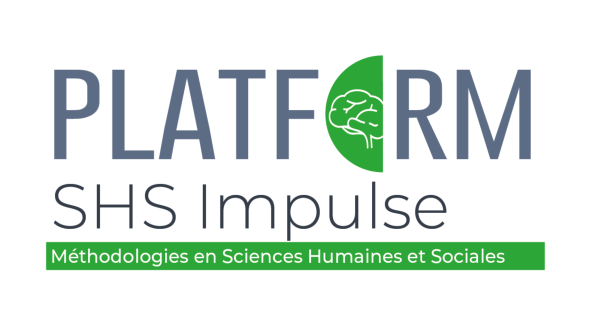
Whether it concerns linguistics, economics, politics, sustainable development, law, history, educational sciences, literature or translation, research in the humanities and social sciences is as eclectic as it is rich and essential for tackling society's challenges. Of UNamur's eleven research institutes, seven are directly involved in SHS research. While there is a high degree of complementarity in these areas of research, better pooling of resources, sharing and easier access to certain services, resources and support will help to sustain and strengthen the excellence of SHS research at UNamur. It is with this in mind that the SHS impulse platform has just been created.
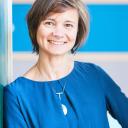
We started from the needs of SHS researchers to establish four axes developed within this platform
.
Resources organized around 4 axes
- Axis 1 - Support for the acquisition of databases, documentary resources and software
- Axis 2 - Subsidy for cutting-edge training in the use of specialized methods
- Axis 3 - Funding access to the SMCS "Support en Méthodologie et Calcul Statistique" platform at UCLouvain, thanks to an inter-university partnership.
- Axis 4 - Setting up an SHS space, containing a laboratory for running experiments and shared work tools promoting exchanges between researchers.
Outlook
This initiative, launched in January 2025, addresses the specific challenges faced by SHS researchers. The long-term aim is to sustain and expand the services. "We will also hire a researcher expert in methodological analysis in SHS who will be able to inform innovative methodologies and frame the methodological design of research projects," emphasizes Sandrine Biémar, vice-dean of UNamur's Faculty of Education and Training Sciences, a member of the IRDENA institute and the SHS Impulse management committee. "The wish is also to support networking between SHS researchers at UNamur and to be a lever for setting up interdisciplinary projects," adds Sandrine Biémar.
The platform's management team is made up of representatives of the university's various SHS institutes, and ensures efficient management of resources. The platform's impact will be assessed during its initial phase (2025-2027), enabling strategies for its sustainability and development to be defined.
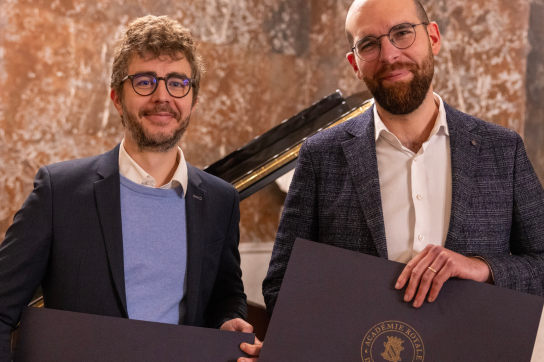
Two UNamur academics join the Collegium of the Académie Royale de Belgique
Two UNamur academics join the Collegium of the Académie Royale de Belgique
Anthony Simonofski and Olivier Sartenaer, have been elected to join the prestigious Collégium de l'Académie royale de Belgique. Bringing together young researchers (under 40) from Wallonia-Brussels who have particularly distinguished themselves in their careers, the Collégium's objectives include promoting the arts and research.
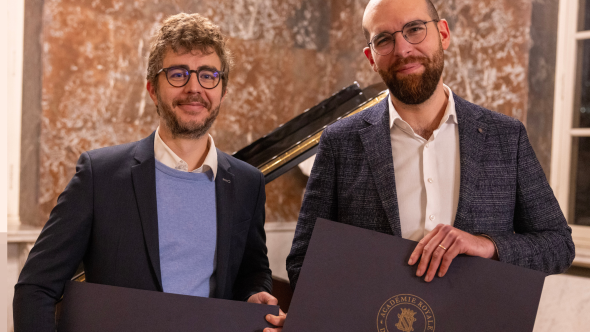
Anthony Simonofski is Professor of Digital Transformation at the UNamur School of Management (EMCP Faculty) and a member of the Namur Digital Institute (University of Namur). It is recognized for its innovative research in governance and digital transformation.
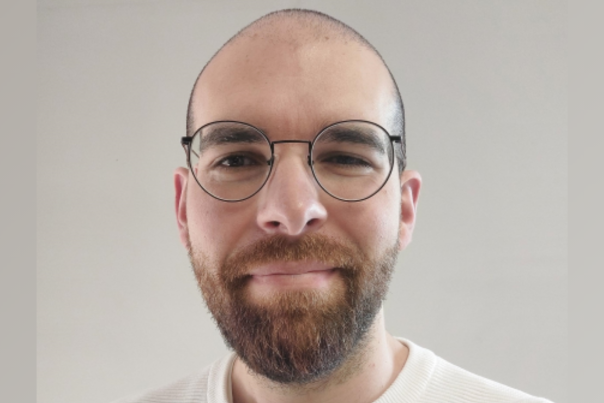
"For 5 years, I'll be part of the Collegium of the Royal Academy of Belgium, and also of the "Technology and Society" class. My participation will enable me to contribute my vision and interdisciplinary expertise on digital transformation. During this mandate, I will be able to participate in the Academy's various work concerning its knowledge dissemination events such as its colloquia or scientific valorization (prizes, competitions, grants)", explains Anthony Simonofski.
One of the missions he hopes to accomplish as part of his mandate is to exchange on digital issues through an interdisciplinary approach. "Today's digital challenges require an interdisciplinary approach, combining IT, managerial, legal, sociological perspectives and much more. The 'Technology and Society' class will enable these exchanges to elaborate constructive reflections for a harmonious integration of digital in our society," he emphasizes. He will also make his expertise in digital transformation available. "It presents a whole series of new challenges such as inclusion, adoption or the necessary participation of citizens. So I'd like to make my research in this area available, and perhaps even encourage the Academy itself to enter into a more participatory approach towards citizens via digital channels," Anthony Simonofski points out.
Author of the podcast "Pop-Code" about digital education, which he is producing with his colleague Benoit Vanderose (Faculté informatique- UNamur), Anthony SIMONOFSKI also defends the concept of art as a vehicle for popularizing science. "At the Collegium, I want to work to make digital research accessible and engaging, by initiating collaborative projects that combine scientific rigor and artistic innovation to reach a wider and more diverse audience." Finally, by becoming a member of the Collegium, Anthony Simonofski will ensure representation of UNamur's expertise on digital, notably by relaying the interdisciplinary vision of the Namur Digital Institute and the EMCP Faculty.
Olivier Sartenaer, meanwhile, is Professor of Philosophy at UNamur and his research focuses on metaphysics and the philosophy of science. "By joining the Collegium, I hope to enrich the reflections of the Humanities and Moral and Political Sciences class with my expertise in epistemology and philosophy of science. I also hope to help bring the class closer to those more oriented towards the natural sciences, thanks to the feet I have somewhat in both universes.
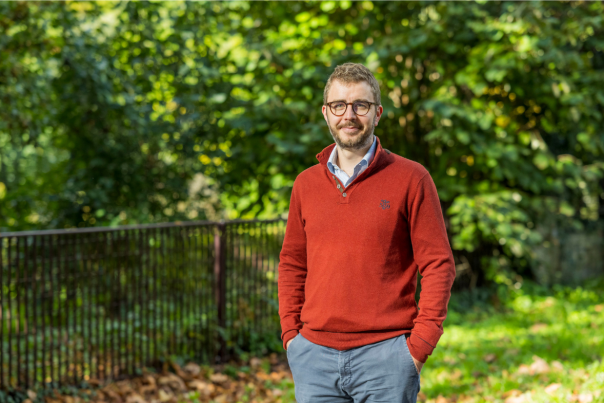
Incidentally, I also hope to represent UNamur there," Olivier Sartenaer points out. "Integrating the Collegium is a nice recognition of my work. Secondly, it will enable me to meet a lot of interesting people and, together, to cross-fertilize our expertise to reflect on major societal issues at our monthly sessions. I'll be able to present and discuss my work, and also discover the work of Belgian scientific colleagues. Finally, it will enable me to take advantage of some of the Academy's support (access to premises, publications, networks, etc.) to organize events, or disseminate my work".
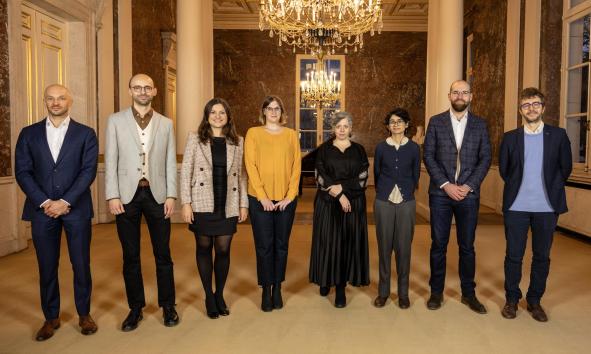
The Collegium of the Royal Academy of Belgium
The Collégium of the Royal Academy of Belgium is a body that brings together young researchers (under 40) from Wallonia-Brussels who have particularly distinguished themselves in their careers. Founded in 2009, the Collégium's mission is to support the Académie in its objectives of promoting the arts and research. It also organises university-level lecture courses, free of charge and accessible to a wide audience.

EMCP Faculty: three researchers receive awards - #1 Floriane Goosse receives double award for her research with societal impact
EMCP Faculty: three researchers receive awards - #1 Floriane Goosse receives double award for her research with societal impact
The NaDI-CeRCLe research center has distinguished itself brilliantly on the international scene in recent weeks. Three young researchers from the EMCP Faculty have received prestigious recognition at leading international events for their research in service management: they are Floriane Goosse, Victor Sluÿters and Florence Nizette. This summer, let's discover the work of these PhD students and their significant contributions to the advancement of knowledge and practice in this field.

After winning the prestigious "Best Research Paper Award" at the SERVSIG conference by the American Marketing Association in 2024 for her thesis paper, Floriane Goosse, a researcher at the NaDI-CeRCLe research center, is among the two winners of the ServCollab Scholarship 2025, an international doctoral scholarship awarded by an American organization dedicated to promoting scientific research with high societal impact.
No fewer than 37 doctoral students from universities around the world were in the running to receive this scholarship. Two researchers were chosen after an in-depth selection process: Griffin Colaizzi, a PhD student in psychology at Northeastern University (USA), and Floriane Goosse, a PhD student at UNamur within NaDI-CeRCLE.
New technologies to empower people with disabilities
Supervised by Professors Wafa Hammedi (UNamur) and Dominik Mahr (Maastricht University), Floriane Goosse's thesis explores how new technologies, such as intelligent voice assistants, can empower people with disabilities, particularly the visually impaired, and thus significantly improve their well-being.
A high-potential project that convinced the members of the ServCollab jury, made up of eminent researchers in the field. The jury was particularly impressed by the young researcher's methodological rigor and praised her alignment with the principles of Transformative Service Research as well as her deep determination to create a tangible impact on the lives of so-called vulnerable people.
Triple recognition for Floriane Goosse
Floriane Goosse also took part in the 19th International Research Symposium on Service Excellence in Management (QUIS19), the bi-annual benchmark conference in service management, held in Rome in early June. On this occasion, his research once again distinguished itself by winning the prize for best research with societal impact, awarded by the conference's scientific committee. This prestigious international recognition crowns a rigorous and deeply committed body of work. Three major recognitions in less than a year, saluting both the scientific excellence and the strong societal impact of a particularly promising piece of research.
.
This recognition means a lot to me, and is a great encouragement for the continuation of my work, which I'm carrying out in collaboration with my co-sponsors, Professor Wafa Hammedi (NaDI-CeRCLE) and Professor Dominik Mahr (University of Maastricht). In my own small way, I'm delighted to be helping to change perspectives in the field of marketing, which is often focused on the corporate world, by putting research at the service of the community.
Find out more about NaDI-CeRCLe
The aim of the NaDI-CeRCLe Research Center is to actively promote theoretical and empirical research, both fundamental and applied, in the field of marketing and services, and more specifically in the areas of consumption and leisure.
.
Is watching gaming gaming? Twitch and the video game revolution
Is watching gaming gaming? Twitch and the video game revolution
A lifelong video game enthusiast, Fanny Barnabé, a researcher at the CRIDS research center (Namur Digital Institute) and lecturer at the University of Namur, explores behind the scenes of a major cultural phenomenon: video game streaming on Twitch. Between humor, irony and toxic discourse, she deciphers the issues at stake in a digital space in the throes of change.

Video games are no longer just a pastime: they've become an object of study in their own right. And Fanny Barnabé is one of its leading figures at UNamur. Trained as a literary scholar, she turned to Game Studies to better understand the complex fictional universes that have always fascinated her. "It was because of video games that I studied literature," she confides with a smile. Today, she's interested in a fast-growing phenomenon: the broadcasting of live video game games on platforms like Twitch.

Twitch, between humor and toxic speeches
On Twitch, millions of viewers watch streamers play their favorite games every day. This practice, known as "secondary gaming" (a concept developed by ULiège researcher Julie Delbouille), involves playing vicariously by watching someone else hold the controller. "Some people no longer play themselves, they watch others play. It's become a fully-fledged way of consuming video games", explains Fanny Barnabé, "Twitch is a space where humor reigns, often in the form of irony or second degree. But it's also a place where toxicity can develop very quickly". Hence the theme of his current research: when does an ironic comment become violent? At what point can we determine whether or not a comment is acceptable in the video game context?
A fast-changing industry
Fanny Barnabé's work doesn't stop at Twitch. She has also studied in-game storytelling, tutorials, or even players' creative practices, such as fan fiction or "machinimas" (films made within games themselves).

Video games are an incredibly rich and interdisciplinary field of study
And this terrain is changing fast. Very fast. "Video games have gone from a niche hobby to a mass phenomenon. Today, over 90% of young people play," she points out. This popularity is accompanied by an economic transformation: in the context of platform capitalism, the practice of gaming tends to become profitable, monetized, professionalized. "We've gone from the game you buy once, to the "game as a service" model, and to streaming, where professional streamers somehow convert their gaming experience into advertising revenue."
A mirror of our changing society
For Fanny Barnabé, it's hard to predict how the world of video games will evolve in the future. "It's becoming very difficult to talk about video games as a single object, so diverse are the practices," she explains. Between mobile games like Candy Crush, e-sport competitions or collaborative online adventures, the uses are multiple and reflect the complexity of our digital society.

This diversity is part of a broader context: that of platform capitalism. "Gaming, which was originally a leisure practice, is now integrated into profit-making logics," observes the researcher. Streaming, in particular, illustrates this transformation: gaming is becoming a productive, income-generating activity, sometimes even a profession in its own right.
Fanny Barnabé - portrait
At 36, Fanny Barnabé recently joined the ranks of UNamur academics. She is a lecturer in the "Social, Political and Communication Sciences" Department of the SciencesPo Economics Management Communication Faculty (EMCP). There, she teaches students in the three-year bachelor's program in interactive and participatory media and digital transition. Next academic year, she will be teaching the Media Narration and Storytelling course.
Fanny is also passionate about Japan. In 2017-2018, she completed a one-year postdoctoral stay in Kyoto, at the Ritsumeikan Center for Game Studies, under the direction of Professor Hiroshi Yoshida, with the help of a Marie-Curie COFUND fellowship from the Université de Liège (co-funded by the European Union). This stay was devoted to the study of video game paratexts.
During the academic mission organized by the Wallonie-Bruxelles International, on the sidelines of the Osaka World Expo, she was able to return to Tokyo and Kyoto to re-establish links with various colleagues specializing in game studies and set up research partnerships between Japanese institutions and UNamur.

Training
Discover our courses in economics, management, communication and political science.

New impetus for the humanities and social sciences at UNamur
New impetus for the humanities and social sciences at UNamur
A new platform dedicated to research in the humanities and social sciences (SHS) is being launched at UNamur. The aim? To offer SHS researchers methodological support tailored to their needs and strengthen SHS excellence at UNamur. This platform, SHS Impulse, will provide various services such as financial support for training, consultancy, access to resources, or co-financed software purchases.

Whether it concerns linguistics, economics, politics, sustainable development, law, history, educational sciences, literature or translation, research in the humanities and social sciences is as eclectic as it is rich and essential for tackling society's challenges. Of UNamur's eleven research institutes, seven are directly involved in SHS research. While there is a high degree of complementarity in these areas of research, better pooling of resources, sharing and easier access to certain services, resources and support will help to sustain and strengthen the excellence of SHS research at UNamur. It is with this in mind that the SHS impulse platform has just been created.

We started from the needs of SHS researchers to establish four axes developed within this platform
.
Resources organized around 4 axes
- Axis 1 - Support for the acquisition of databases, documentary resources and software
- Axis 2 - Subsidy for cutting-edge training in the use of specialized methods
- Axis 3 - Funding access to the SMCS "Support en Méthodologie et Calcul Statistique" platform at UCLouvain, thanks to an inter-university partnership.
- Axis 4 - Setting up an SHS space, containing a laboratory for running experiments and shared work tools promoting exchanges between researchers.
Outlook
This initiative, launched in January 2025, addresses the specific challenges faced by SHS researchers. The long-term aim is to sustain and expand the services. "We will also hire a researcher expert in methodological analysis in SHS who will be able to inform innovative methodologies and frame the methodological design of research projects," emphasizes Sandrine Biémar, vice-dean of UNamur's Faculty of Education and Training Sciences, a member of the IRDENA institute and the SHS Impulse management committee. "The wish is also to support networking between SHS researchers at UNamur and to be a lever for setting up interdisciplinary projects," adds Sandrine Biémar.
The platform's management team is made up of representatives of the university's various SHS institutes, and ensures efficient management of resources. The platform's impact will be assessed during its initial phase (2025-2027), enabling strategies for its sustainability and development to be defined.

Two UNamur academics join the Collegium of the Académie Royale de Belgique
Two UNamur academics join the Collegium of the Académie Royale de Belgique
Anthony Simonofski and Olivier Sartenaer, have been elected to join the prestigious Collégium de l'Académie royale de Belgique. Bringing together young researchers (under 40) from Wallonia-Brussels who have particularly distinguished themselves in their careers, the Collégium's objectives include promoting the arts and research.

Anthony Simonofski is Professor of Digital Transformation at the UNamur School of Management (EMCP Faculty) and a member of the Namur Digital Institute (University of Namur). It is recognized for its innovative research in governance and digital transformation.

"For 5 years, I'll be part of the Collegium of the Royal Academy of Belgium, and also of the "Technology and Society" class. My participation will enable me to contribute my vision and interdisciplinary expertise on digital transformation. During this mandate, I will be able to participate in the Academy's various work concerning its knowledge dissemination events such as its colloquia or scientific valorization (prizes, competitions, grants)", explains Anthony Simonofski.
One of the missions he hopes to accomplish as part of his mandate is to exchange on digital issues through an interdisciplinary approach. "Today's digital challenges require an interdisciplinary approach, combining IT, managerial, legal, sociological perspectives and much more. The 'Technology and Society' class will enable these exchanges to elaborate constructive reflections for a harmonious integration of digital in our society," he emphasizes. He will also make his expertise in digital transformation available. "It presents a whole series of new challenges such as inclusion, adoption or the necessary participation of citizens. So I'd like to make my research in this area available, and perhaps even encourage the Academy itself to enter into a more participatory approach towards citizens via digital channels," Anthony Simonofski points out.
Author of the podcast "Pop-Code" about digital education, which he is producing with his colleague Benoit Vanderose (Faculté informatique- UNamur), Anthony SIMONOFSKI also defends the concept of art as a vehicle for popularizing science. "At the Collegium, I want to work to make digital research accessible and engaging, by initiating collaborative projects that combine scientific rigor and artistic innovation to reach a wider and more diverse audience." Finally, by becoming a member of the Collegium, Anthony Simonofski will ensure representation of UNamur's expertise on digital, notably by relaying the interdisciplinary vision of the Namur Digital Institute and the EMCP Faculty.
Olivier Sartenaer, meanwhile, is Professor of Philosophy at UNamur and his research focuses on metaphysics and the philosophy of science. "By joining the Collegium, I hope to enrich the reflections of the Humanities and Moral and Political Sciences class with my expertise in epistemology and philosophy of science. I also hope to help bring the class closer to those more oriented towards the natural sciences, thanks to the feet I have somewhat in both universes.

Incidentally, I also hope to represent UNamur there," Olivier Sartenaer points out. "Integrating the Collegium is a nice recognition of my work. Secondly, it will enable me to meet a lot of interesting people and, together, to cross-fertilize our expertise to reflect on major societal issues at our monthly sessions. I'll be able to present and discuss my work, and also discover the work of Belgian scientific colleagues. Finally, it will enable me to take advantage of some of the Academy's support (access to premises, publications, networks, etc.) to organize events, or disseminate my work".

The Collegium of the Royal Academy of Belgium
The Collégium of the Royal Academy of Belgium is a body that brings together young researchers (under 40) from Wallonia-Brussels who have particularly distinguished themselves in their careers. Founded in 2009, the Collégium's mission is to support the Académie in its objectives of promoting the arts and research. It also organises university-level lecture courses, free of charge and accessible to a wide audience.


